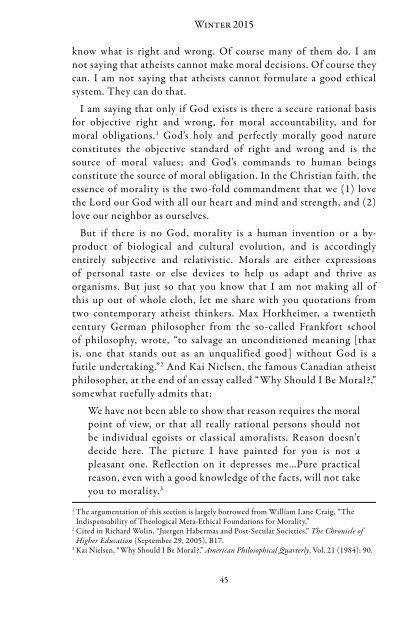THE CITY
h6c7p5d
h6c7p5d
Create successful ePaper yourself
Turn your PDF publications into a flip-book with our unique Google optimized e-Paper software.
Winter 2015<br />
know what is right and wrong. Of course many of them do. I am<br />
not saying that atheists cannot make moral decisions. Of course they<br />
can. I am not saying that atheists cannot formulate a good ethical<br />
system. They can do that.<br />
I am saying that only if God exists is there a secure rational basis<br />
for objective right and wrong, for moral accountability, and for<br />
moral obligations. 1 God’s holy and perfectly morally good nature<br />
constitutes the objective standard of right and wrong and is the<br />
source of moral values; and God’s commands to human beings<br />
constitute the source of moral obligation. In the Christian faith, the<br />
essence of morality is the two-fold commandment that we (1) love<br />
the Lord our God with all our heart and mind and strength, and (2)<br />
love our neighbor as ourselves.<br />
But if there is no God, morality is a human invention or a byproduct<br />
of biological and cultural evolution, and is accordingly<br />
entirely subjective and relativistic. Morals are either expressions<br />
of personal taste or else devices to help us adapt and thrive as<br />
organisms. But just so that you know that I am not making all of<br />
this up out of whole cloth, let me share with you quotations from<br />
two contemporary atheist thinkers. Max Horkheimer, a twentieth<br />
century German philosopher from the so-called Frankfort school<br />
of philosophy, wrote, “to salvage an unconditioned meaning [that<br />
is, one that stands out as an unqualified good] without God is a<br />
futile undertaking.” 2 And Kai Nielsen, the famous Canadian atheist<br />
philosopher, at the end of an essay called “Why Should I Be Moral?,”<br />
somewhat ruefully admits that:<br />
We have not been able to show that reason requires the moral<br />
point of view, or that all really rational persons should not<br />
be individual egoists or classical amoralists. Reason doesn’t<br />
decide here. The picture I have painted for you is not a<br />
pleasant one. Reflection on it depresses me…Pure practical<br />
reason, even with a good knowledge of the facts, will not take<br />
you to morality. 3<br />
1<br />
The argumentation of this section is largely borrowed from William Lane Craig, “The<br />
Indispensability of Theological Meta-Ethical Foundations for Morality.”<br />
2<br />
Cited in Richard Wolin, “Juergen Habermas and Post-Secular Societies,” The Chronicle of<br />
Higher Education (September 29, 2005), B17.<br />
3<br />
Kai Nielsen, “Why Should I Be Moral?,” American Philosophical Quarterly, Vol. 21 (1984): 90.<br />
45


